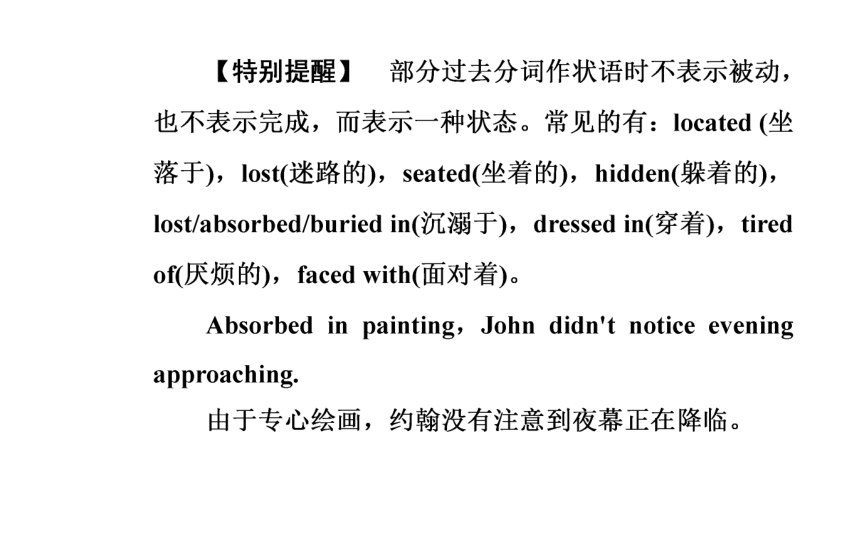提高学习效率降低教育支出
happen , take place
二者都有“发生”的意思。happen指事情的发生提升的同义词,往往带有”偶然”的意思。
It happens that I am free today.
恰好今天我没有事。
take place指事先安排或策划好而后发生,没有”偶然”的意思。
must, have to
must表示说话人的主观看法;而have to则表示客观需要。
mustn t意为“不可以;不允许”;don t have to意为“不必”。
如:(1)My father had to work when he was ten years old。
(2)The play is not interesting.
I really must go now。
arrive , reach , get to
三者都有“到达”之意。
reach为及物动词。
They reached Tianjin yesterday.
昨天他们到达天津。
arrive为不及物动词,后面接介词in或at。get to常用于口语,可代替前二者。
because , because of
二者均表示“因为”
because是连词,引导状语从句。
We stayed at home because it rained. 因为下雨,我们呆在家。
because of是短语介词,后面接名词性词语。
We stayed at home because of the rain .
因为下雨,我们呆在家。
in front of, in the front of
in front of…
意思是”在……前面”,指甲物在乙物之前,两者互不包括;其反义词是behind(在……的后面)。
如:He walked in fount of me。
他走在我的前面。
There are some flowers in fount of the house。
房子前面有些花卉。
in the front of
意思是”在某一空间内的前部”,即甲物在乙物的范围之内;其反义词是at the back of…(在……范围内的后部)。
如:There is a big desk and a blackboard in the fount of our classroom。
我们的教室前边有一张大桌子和一块黑板。
Our teacher stands in the fount of the classroom。
我们的老师站在教室前。
look , see , watch
三者都有“看”的意思。
look是看的过程。
I looked , but saw nothing .
我看了,但什么也没看见。
see是看的结果。
see a film 看电影
see a play 看戏(话剧)
watch是看移动的事物或定晴地看。
watch a football match 看足球比赛。
watch TV 看电视
sometime; sometimes
some time; some times
sometime是副词,可与过去时或将来时连用,表示”(在过去)某个时候”或”(在将来)某个时候”。
如:I saw him sometime in May。
some time多数情况下作名词短语,意为”一些时间;一些时候”;它还可以作副词词组,用来表示一个未肯定的时刻,此时它可与sometime互换。
如:I ll be away for some time。
sometimes是一个表示时间频率的副词,意为”有时候”。
如:Sometimes I help my mother with the housework。
some times是”几次、几倍”之意。
如:They have been there several times。
how long, how often
how far, how soon
how long意为”多久、多长时间”,主要是对一段时间进行提问,
答语通常是(for)three days/weeks/months等时间段,它可用于各种时态。
How long do you stay in Beijing every year?
每年你在北京住多久?
how often意为”多久……次、是否经常”,用来提问在某一特定的时间进行某个动作的次数,答语通常是always,usually,often,sometimes,once/twice a day/month等。
How often do you get to school very early?
你多久早到校一次?
how far意为”多远”,对距离提问时用。
How far is that?
那有多远?
how soon意为”还要多久”,是对从某个基本时间到将来某动作结束或某动作发生这段时间提问,常用在一般将来时态的句子中,其答语通常是”in + 一段时间”。
-How soon can you finish the work?
还要多久你能完成这项工作?
-In half an hour.
半小时后。
agree with
agree to,agree on
两者都有“同意”、“赞成”的意思。
agree with 后面常接表示人或意见(看法)的名词作宾语。
agree with 还有“适合”、“符合”的含义。
如:The climate here doesn t agree with him。
他不适合这里的气候。
agree to 后面一般接表示提议、办法、计划之类的名词作宾语。agree on就…达成一致的意见。
across , cross, crossing
through, past
(1) cross 意为“横过, 穿过”为动词,相当于walk(go,run)acrossLook both ways before you cross the road。
(2) across意为“横过,穿过”为介词,不作动词,不能作谓语,常放在动词之后,
如:go acrossHe walked across the field。
(3) through 是介词,含有“从…中间穿越”之意,表示四周含有物体的穿越。
The ball went through the window。
(4) past既可作形容词也可作副词,做副词时有:“穿过,越过”之意。
Will you be going past my house on your way home?
(5) crossing意为“渡口,人行横道,(铁路与公路的)交叉点。
All the cars should stop before the zebra crossing。
on,in,with
(1) on:表示使用通讯工具、信息或传媒,乘坐交通工具等;
I don t want to talk about it on the phone。
(2) in:使用语言文字等媒介;
Can you speak it in English?
(3) with:借助具体的手段或工具。
Don t write it with a red pen。
at,on,in
at, on, in三者都可以表示”在……的时候”。
(1) at:表示在哪个时刻用;表示时间点。
I get up at six o clock in the morning .
我早晨六点起床。
(2) On:表示在哪一天,哪一天的早上(下午、晚上);
on Wednesday , on Sunday morning , on May I , on a cold morning in 1936
(3) in:表示在哪一年(季、月),在上午,下午等。
in September , in the morning , in the afternoon
few, a few; little , a little
虽然都表示“少”,但few, a few是可数的, little, a little是不可数的。
a few, a little含肯定意味,few, little含否定意味。
(1) They have a little ink, don t they?
他们有一点墨水,是吗?
(2) They have little ink, do they?
他们几乎没有墨水,是吗?
(3) She has a few Chinese friends, doesn t she?
他有几位中国朋友,是吗?
(4) She has few Chinese friends, does she?
他几乎没有几位中国朋友,是吗?

(5)She has a little dog。
她有一只小狗。
not … until, until
not … until 直到…才… (主句动词是短暂性动词)
(1) He didn t go to bed until his mother came back。。
until 一直到… (主句中使用延续性动词)
(2) I study hard until it is midnight every day。
spend, pay, cost, take
(1) Sb. Spend … on sth.
某人花了…(时间、金钱)在某事上。
I spend ten yuan on the book。
(2) spend (in) doing sth.
某人花了…(时间、金钱)做某事。
She spent two hours in drawing the house。
(3)Sb. pay …for …sth.
某人为某物花了…钱。
I paid 50 yuan for the clothes。
(4) Sth. cost sb. …
某物花了某人…钱。
It cost us five dollars。
(5)It takes/took sb. … to do sth.
花了某人…(时间、金钱)做某事。
It takes us ten minutes to brush my teeth every day。
too much, too many, much too
too much + 不可数名词 too many + 可数名词 much too + 形容词、副词
(1)There is too much milk in the basket。
(2) She ate too many biscuits yesterday morning。
(3) He runs much too quickly。
(4) The chair is much too expensive。
after , in
(1) After+时间段 表达过去一段时间以后,常用于过去时态的句子;
I received the letter after two days .
我是两天以后收到这封信的。
(2) After+时间点 表示将来一段时间以后,用于将来时态的句子。He will arrive after four o clock 。
(3) in+时间段 以现在为起点,表示将来一段时间以后提升的同义词,常用于将来时态的句子。
You will receive the letter in three days .
你三天以后将收到这封信。
ago , before
(1) ago立足于现在,表示从现在起,若干时间之前;
ago 通常与一般过去时连用,不能与完成时连用;
I met him three years ago 。
(距今)三年前,我遇到他。
(2) before立足过去,表示从过去某一时刻起,若干时间以前。before通常与过去完成时连用。
I had met him three years before 。
(距当时)三年前我见到他一次。
alone, lonely
alone是表语形容词,只能作表语用。
Though I am alone, I am not lonely。
虽然我孤独一人,但我并不感到寂寞。
lonely除了有”孤独的”意思外,还有”寂寞的”意思。
另外说明特点时还有“人迹稀少的”、“荒凉的”意思。
He was taken to a lonely house.
他被带到一个荒无人烟的房子内。
also , either , too , as well
also用于肯定句.
You study English and I also study it。
你学英语,我也学。
either用于否定句,并放在句尾;
You don t study English and I don t study it either。
你不学英语,我也不学。
too和as well 用于肯定句,放在句尾,多用于口语。
例如:You are a student and I am a student, too.
你是学生,我也是。
You know the way and I know it as well.
你知道路,我也知道。
as,when,while
When:可与一个点的时间或表示一段的时间连用,从句动词可以是短暂性或延续性动词。
从句的动作和主句的动作可以同时,也同先于主句的动作。
When the teacher came in,the students stood up。
当老师进来时,学生们起立。
While:只指一段时间,不能指一点时间。
因此while从句中的谓语动词必须是延续性动词。表示一段较长的时间或一个过程,主句和从句的动作同时发生。
Don t talk while you are eating。
吃饭时你不要说话。
As:主句和从句的动作同时发生,有时可译作“一边……,一边”。
begin,start
二者均可表示“开始”一般可以通用,但start较为口语化。
It has be gun(started) raining。已经开始下雨了。
start还可表示“动身”、“开动”等意思,而begin则不能这样用。
例如:They start for Beijing tomorrow。
他们明天动身去北京。

date,day
date指”日期”。
What s the date today?
今天几号?
day指”星期几”,指二十四小时的一整天;也单指白天;也指重要的日子。
What day is today?
今天星期几?
There are seven days in a week。
一周有七天。
National Day
国庆节
besides,except,exceptfor,but
“除……之外”
besides的意思是”除…之外,还有…”是肯定的;
包括besides后面的宾语在内,含有”加上”的意思。
I have three other pens besides this。
除了这支笔外,我还有另外三支笔。
except(but)的意思是”除……之外,没有…”是否定的;不包括except后的宾语在内,含有”减去”的意思。
but用于”除了”之意时,只能用于noone,nobody,nothing,all,everyone,everything等词之后。
Everybody is here except(but) Mary。
除了Mary之外,大家都来了。
except for的用法是在说明基本情况后,而在细节上加以纠正。
except for有时可以与except互换,表示”除了……之外”,但位于句首时,不可以和except互换。
例如:Your composition is good except for some spelling mistakes。
除了有几个拼写错误之外,你的作文很好。
besides意为”除了……之外,还有”except意为”除了……之外”
but用于”除了”之意时,只能用于noone,nobody,nothing,all,everyone,everything等词之后。
bring,take,fetch
bring是”带来”。
例如:Don t forget to bring adictionary with you。
别忘了把辞典带来。take是”带去”。
例如:Please take the small blackboard to the classroom
请把这块小黑板带到教室去。
fetch是”去取”,”去拿来”。
例如:Please fetch me some chalk。
borrow,lend
二者都有”借”的意思。
borrow是”借入”,lend是”借出”。
例如:Can I borrow your pen?
我可以借你的钢笔吗?
Lend me your pen,will you?
把钢笔借给我用用,可以吗?
限 时 特 惠: 本站每日持续更新海量各大内部创业教程,加站长微信免费获取积分,会员只需38元,全站资源免费下载 点击查看详情
站 长 微 信: thumbxmw

